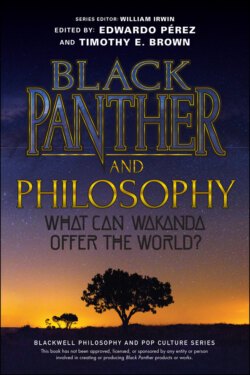Читать книгу Black Panther and Philosophy - Группа авторов - Страница 12
“Let the Challenge Begin”
ОглавлениеExamples from Wakanda might show that Burke was right. The first Black Panther film establishes that Wakanda’s monarchy is semi-hereditary, with the oldest (probably male) members of the Panther Tribe being the first in line to rule. When T’Chaka dies in Captain America: Civil War, his son, T’Challa, inherits the throne, but who gets to be king is not decided merely by inheritance. Before T’Challa officially takes the throne, all of Wakanda’s tribes come together and have the chance to offer up a challenger for the throne. Any challengers must fight the presumptive king in ritual combat in order to earn the right to rule.
People from the industrialized West might look at this traditional way of transmitting power and say that it is irrational. Those who favor meritocracy or republicanism might say that being the son of a king does not give a man the right to rule. Moralists might object to the idea that mere physical strength makes a man fit to govern, saying that his moral character is far more important. Feminists might argue that patriarchy is poisonous for society and that Wakanda needs more women in power. Classical liberals would question the very idea of having a king at all, saying that monarchy itself is unjust and dangerous.
While each of these criticisms might have its merits, Burke would probably say that we make a mistake if we seek to throw out the “old ways” of Wakanda and create new ones built on reason alone. So if revolutionaries with aspirations to abstract ideas like liberty and equality suddenly seized power and abolished the Wakandan monarchy, the result wouldn’t necessarily be good. Even though they might seem irrational to outsiders like us, anyone can see from the Challenge Day scene in Black Panther that Wakanda’s traditions provide social cohesion that a purely rational system cannot possibly create. The reverence that the Wakandans have for their traditions tempers old tribal tensions and petty rivalries that might otherwise develop into social dysfunction or erupt into civil war. Dispensing with the traditions in one fell swoop would result in anything but liberty or equality.
We can see this most clearly when M’Baku arrives with representatives from the Jabari Tribe in order to challenge T’Challa for the throne. The people have gathered at the waterfall to witness their king’s coronation, members of each tribe dressed in their ceremonial finery to honor the solemnity of the event. Shuri, T’Challa’s brilliant but unorthodox sister, complains about her corset and asks if they can “wrap it up and go home.” Though she does not completely disregard the customs involved in the coronation, she does show a youthful irreverence that some might find scandalous. When M’Baku arrives with his men to challenge T’Challa, he complains that Wakanda’s “technological advancements have been overseen by a child … who scoffs at tradition!”
This scene sets up audiences to view M’Baku as one of the film’s antagonists (especially those of us who have read the comics). We might see Shuri as a representative of scientific and social progress and M’Baku as a remnant of an antiquated devotion to custom. But first appearances can be deceiving. Indeed, it is M’Baku’s reverence for tradition that allows for the peaceful transfer of power. When T’Challa defeats him in ritual combat, M’Baku yields and abandons his bid for the throne. A man with less reverence for tradition might use whatever means necessary to acquire power, starting a civil war.
In a paradoxical way, M’Baku’s commitment to the Challenge Day tradition with its underlying might-makes-right assumption could very well protect society from being subjected to something far more irrational. The ritual probably developed as a way to settle disputes between tribes that would cause open warfare and the domination of some tribes by others. By formalizing humanity’s old might-makes-right instinct, the Challenge Day ceremony turns it into a ritual that allows for the freedom and dignity of each tribe.
That doesn’t mean that the traditions surrounding the transfer of power in Wakanda can’t or shouldn’t change, of course. But Burke would argue that any change ought to happen organically and slowly. It would be perilous to suddenly abolish the tradition and replace it with a more “rational” means of transferring power.
